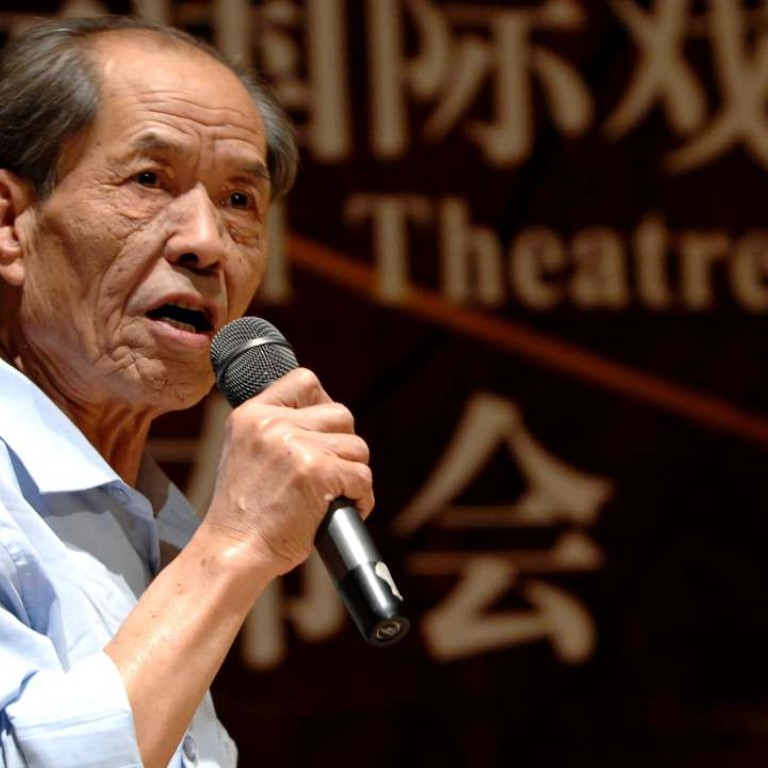
Chen Zhongshi, author of acclaimed White Deer Plain – China’s One Hundred Years of Solitude – dies at 73
Chen Zhongshi
1942-2016
Chen Zhongshi, one of China’s most respected authors, who has died aged 73, wrote the novel, White Deer Plain – widely regarded as a masterpiece – which won him China’s top literature prize.
The 1993 novel focusing on the cultural roots of Chinese society, helps defines the national identity and, in a subtle way, enhances the legitimacy of President Xi Jinping’s leadership
Chen, who was born in Shaanxi province in 1942 and first started writing prose in 1962, died of cancer on Friday in Xian.
If a person truly wants to read about how Chinese people think and how Chinese society runs, he shouldn’t miss the book. White Deer Plain is a classic
His masterpiece, adapted into a 2011 film directed by Wang Quanan, starring Zhang Fengyi and Zhang Yuqi, uses a mix of magic and realism in a multigenerational plot that weaves familial love, hatred, feuds and betrayal – just like Gabriel Garcia Marquez’s One Hundred Years of Solitude – set in the wheat-growing plain of Bailuyuan, or “White Deer Plain”.
The main character, Bai Jiaxuan, is a serious patriarchal leader who is committed to his Confucius values and local etiquette, despite all the sufferings and changes time has brought to his village. He resembles an idealised traditional Chinese chieftain, who leads with moral authority.
“If a person truly wants to read about how Chinese people think and how Chinese society runs, he shouldn’t miss the book,” said Zhao Yong, a literature professor at Beijing Normal University. “White Deer Plain is a classic.”
Chen immersed himself in local archives and folk tales, locking himself away for four years in his ancestor’s cottage, living on bread and cigarettes until it was finished.
His epic tale follows the lives of two peasant families as they struggle over the generations, from the end of China’s Qing dynasty in the early 1900s up to the 1950s, after the Communist Party’s victory over the ruling Kuomintang and the establishment of the People’s Republic of China in 1949.
Chen and other Chinese writers, such as Jia Pingwa and Lu Yao, who spent decades living in rural Shaanxi, are regarded as the best at portraying the traditional values through tales of China’s bleak and hard country life.
Xi and his right-hand man, Wang Qishan, the Party’s anti-graft chief – shared similar experiences during their youth in remote countryside areas. Xi’s time in Liangjiahe village, in Shaanxi, helped form the key moral principles he has used to rule the nation. He said Shaanxi’s rural life made him know “what is reality, what is truth, who the people are”.
Chen’s White Deer Plain was inspired by Lu who published the trilogy, Ordinary World in 1986, which focused on how young people in rural Shaanxi fight against poverty and ignorance with courage and optimism.
Lu, who died in 1992 aged 43, was a close friend of Xi and the two men “stayed in the same earth cave” for several nights in early 1970s while exchanging views about life and literature, according to official Chinese media reports.
While Mo Yan uses Chinese language to present a quite Westernised story, Chen is using Chinese language about a Chinese story
While Chen’s book is by no means an endorsement of authoritarian rule, it offers a peek into the ideas and concepts still shaping Chinese social life.
The book is widely known throughout China – having won the prestigious state-backed Mao Dun literature prize and selling at least five million copies, including pirated versions – but remains relatively unknown outside the country, partly because of the lack of an English-language version.
When Mo Yan won the Nobel prize in literature in 2012, many Chinese literature critics believed that Chen should be the next Chinese author to be similarly recognised.
“While Mo Yan uses Chinese language to present a quite Westernised story, Chen is using Chinese language about a Chinese story,” said Li Jianjun, a researcher of contemporary Chinese literature at the Chinese Academy of Social Sciences.
At the same time, Li warned that the social structures underpinning the traditional values of a rural and closed society, which are praised by Chen in White Deer Plain – are quickly being replaced by an urban and vibrant society, as economic liberalisation sweeps across even China’s most remote corners.
Chen started to write his book in 1987, when China was a much poorer and closed nation than it is today.

